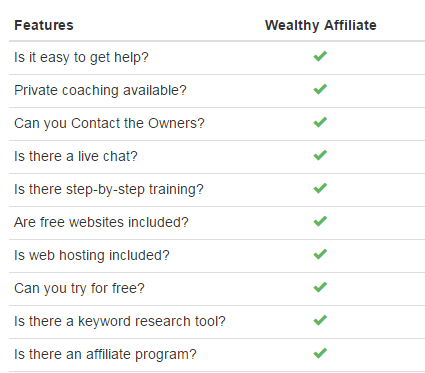 How many times have you searched the internet for a job or money making opportunity only to find yourself falling for yet another online scam? More than you can count, right?
How many times have you searched the internet for a job or money making opportunity only to find yourself falling for yet another online scam? More than you can count, right?
Despite the awareness and security implementation, many of us are still scam victims mainly due to these two reasons; 1) We don’t know how to spot for one and 2) The scam artists are getting better at what they do.
I like to think that we can be smart internet users too. So I gathered some clever ways on how you can identify an online scam the next time you see one.
(1) Scan the Content
Yup, don’t read them just yet. Scan from the top until the end of the page to get an overall impression on how the site makes you feel. Most scams don’t focus on creating good quality content so they tend to produce pages with very thin information, probably around 300-400 words stuffed with hyperlinks or advertisements which I am sure you have seen before.
Some pages will take forever to load or have misalignment of text because scammers couldn’t be bothered to update on website functionality like a legitimate company would.
(2) Read the Details
Now, if the pages do have length, you can start to read. What is this ‘opportunity’ that they are offering you? How can you make money with this product?
For example, promoting a starter kit is one thing, but showing you how to use it in order to profit is a different matter altogether. If they keep telling you to buy more, chances are you are making them rich instead of the other way round.
Often times, they would assure you that ‘there’s minimal work involved’ and that ‘the profit’ builds up very quickly. In fact you could be earning thousands by next week. Sounds familiar, right?
Seriously, are you going to believe that? Even our parents taught us to work hard in order to succeed so what makes you think that a total stranger would reward your minimal effort with a 5 figure income within a week?

Sometimes, instead of getting you to buy, they would offer it for ‘free’. All you have to do is to ‘click on this link’ or ‘fill out a contact form’ using a squeeze page to get started.
Spam links can potentially harm your computer and scammers usually skip the email verification process once you have given them the permission to contact you.
Now, their aim is to wire a malware into your computer to detect other private log-in information which can be used to steal your identity. So think twice before you click on those links and learn to stay safe on the internet.
(3) Read Between the Lines
Scam artist are very good at manipulating our emotions and they always take it a step further by tapping on our greed, fear and vanity. Instead of providing facts, they psychologically influence our desires and make us act based on our impulses rather than educated choices.
Words like ‘3 more days before the offer ends’ simply want you to make up your mind without too much consideration. The faster you complete the online transaction, the easier they can make money out of you.
Some sites, I find, are more farcical than they are spammy. Grammatical errors and repetitive phrases that don’t read like humans make you wonder if they even read through their own content in the first place.
On top of that, using the influence of Mr. Z, the ‘general secretary’ of XOX International Bank as part of the deal is totally illogical. Consider this for a moment – why would someone in a high position of a company (that you haven’t heard of) be involved in an online opportunity that only requires a few clicks of a button?
(4) Check Out the Fishy Media
Scam sites are often decorated with cash and money logos everywhere (even online banking sites do that with moderation). Some also display images of mansion, holiday retreats and luxurious cars to show off their fortunes.
On top of that, there’s the ‘life-changing’ videos that are so convincing, they make you want to join immediately. They always seem to sound very real because hey, that’s what actors do best!
Remember that these are all the psychological persuasions that are used to make you to give them what they want.
(5) ‘Try To’ Connect with Them
A company website is always created by someone and if they are legitimate, they will offer contact details in a visible manner. If you have any doubt, you should be able to write to them and be responded to promptly.
If you don’t hear from them after several attempts, forget about it. They are probably not interested in getting to know you too. Should the company offer a free trial, it could be your best tool to get to know them inside and out.
Use the free access to validate who you are dealing with, what’s the quality of their products and services and what are their terms and conditions. If they require a credit card number in advance, make sure that there’s always an option for you to cancel your participation if you change your mind.
And then there’s a social networking profile to check. Find out if they;
- Have that ‘follow me button’ on their webpage.
- Provide a valid social profile about their company.
- Engage in social discussion within the community.
- Have any followers (at all)?
Even if they do, watch out if they are bombing spam links on social media. If they are true scam sites, chances are they aren’t going to garner a huge fan base because it’s going to backfire on their own authenticity in the online world.
(6) Google Them
Last but not least, who else would know if they are real scammers? If they readily appear on search results, Google is probably indexing them for something else too.
Just type in the company’s name in the search bar and add the word ‘scams’ at the end. Negative reviews contain real stories from people who have had bad experiences with online scams and are posting it for the benefit of others.
Regardless of their activities, if they have done an outright dishonest deal, someone is going to write about it big on the internet which is likely going to show up on the search results page too.
Have You Spotted It?
Now that you know how to identify online scams, you are more likely to prevent yourself from getting into trouble and discover legitimate opportunities that can help you reach your goals.
Have you been looking for a better and safer way to make money online? Wealthy Affiliate has been around for years, providing training for people who are interested to start an online business, the right way. Here are just some of the tools to help you get started.

They offer a free trial too, so you have absolutely nothing to lose. If you are interested, follow the link below to find out more. Do you have any thoughts or questions about online scams? Feel free to leave your comment below and I’ll get back to you.

OH, I’ve fallen for the online “scam trap” many a times because I was too naive!
Your 6 ways on identifying online scams sure have been an eye opener for me. Looking back on my mistakes, I can now connect the dots, so to speak.
As for scanning the content, I’m consistently seeing people share short “scammy” articles on media sites like Facebook that are filled with links and also many images to encourage people to do more clicking.
Your scam tips will be a big help to me as I move forward online from now on.
Hi there Neil,
Facebook is not an exception when it comes to scam activities, but I believe they are quite strict about what gets published in your profile or page. It’s also something that you want to look into when sharing about your business online to avoid being mistaken for posting some scammy on Facebook.
If you need any help moving forward, just let me know, ya.
Hi Cathy,
I wish I read this article in the beginning of my online money making journey. I have been scammed so many times that I lost count. You nailed it on the head when you mention that they feed off of peoples emotions and desperation. Going through this process made me very scared to try anything new provided online but I was really lucky to find Wealthy Affiliate.
Hi Xander, I can totally resonate with you because I too have gone through the same situation. Fortunately, at Wealthy Affiliate, you’ll not find any of these. I’ve been a member for 2 years now and it’s nothing but good quality training, great community engagement and prompt technical support for your website.
Hi Cathy,
I think the reason that most of us fall for these scams, is that we want to believe it’s possible to earn lot’s of money easily. Out of curiosity, greed or perhaps desperation, we may be willing to give something a try even if in our heart of hearts we know this can’t be true. Anyway, that’s how I’ve been caught before, but once is more than enough.
I’m sure your awesome post will help some people avoid the scammers.
It’s scary how many scams are out there flying around on the internet, but your prevention tips are outstanding.
There’s a lot of people looking for legitimate opportunities to earn money only, and fraudsters are lurking at every corner in an attempt to take advantage of innocent people.
If something seems too good to be true, it probably is. Guarantees of huge profits in very short periods of time, talk of earnings on “autopilot”, etc. are some red flags.
It’s unfortunate that it has to be this way, but the good news is that there are some legitimate services out there. Just be careful!
Yup, there are legitimate companies and if they offer any form of free trial, that would be the best way to check out their products and services. Wealthy Affiliate University for example, allows you to be a Starter member (without any credit card information) with a 1-week access to Premium features. Their product is all about good quality training. Even if you decided not to upgrade, you can still stay as a free member forever.
Hello Cathy! I think another great tip about looking out for scams is that people should make sure that they’re not giving out too much information for a product. Identity thieves rely on this sort of thing.
Also, if you think you’re going to be buying a crap product that promises riches beyond anyone’s wildest dreams, look for pictures of huge houses with flashy cars. That’s how they get to prey on your emotions. Good review though Cathy, I thought I’d add some in for ya 🙂
Thanks for your input, Jason. Definitely keep your personal information PERSONAL. I wouldn’t give away my credit card number or telephone number, if the product can’t prove its worth.
Great tips on spotting online scams! I like how you hit on “spotting the fishy media.” In my opinion, not enough people do this. They are lured in by the pictures of the fancy boats and stacks of cash but never stop to think about how suspect it really is. If they have all of these things, why do they need your money?
I hope your tips get to a lot of people so they can avoid being scammed in the future. Thanks for the great post!!
Hey Cathy,
I’ve been scammed a few times too. I wish I had this information a year ago 🙂 I used to fall for the pictures of them with their fast cars and big mansions. But now I know that you can easily create your own (Photoshop).
Hi Julian,
It’s amazing how people still fall for these stories in this age and time. As they say, we always learn something from our experience. Hopefully you are able to provide better information for your readers through your own business website.
Good information. Being in data security, I encounter this “stuff” all the them. Gets very tiring, yet people still fall for it, especially phishing attempts. It is amazing how many times our network was compromised because someone clicked on a link they shouldn’t have.
Hi Dave, thanks for the insights. Links can be disguised in so many ways that ordinary users won’t even know the harmful side of it. One of the tips for staying safe on the internet is to hover over the suspicious link and read what the title says. If it’s something that makes sense, it’s probably a safe link. If it’s a lengthy one with weird codes, then you probably should not touch it.
Hello and thanks for this great article on scams and how to avoid them. I must admit I’ve only been scammed once, but I think that’s more by luck than judgement! Your tips here are really useful and I’ve bookmarked it.
Hi Peter,
Being scammed once is more than enough, I think. But these people are always coming up with a variety of ways to make you lose money. So, just beware of new tactics as you become more experienced.
Cathy,
Thank you for one of the simplest and most easy to understand reads, on what to look for from the online scammers!
In all honesty, had I found a post like this some 8 or so years ago, I would have spared myself quite a bit of heartache, wasted money and crushed dreams. I was a Sap and I fell for things that in retrospect amaze me.
I truly wish you the best at getting this advice in front of as many folks as you are able, you covered all the keys from the initial “Gut” feel to contacting them if possible.
Thank you for your feedback Gary.
Scams are so rampant and real these days, people can’t even tell the difference anymore. The fraud pattern is becoming so obvious that I thought “Why can’t people see it already???”. I have personally tried the contact method and authenticating through social profiles and true enough, they would usually expose the scammers.
By the way, I have not heard of SAP. What is it all about?